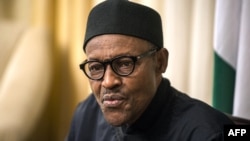President Muhammadu Buhari won a historic election victory in Nigeria this year in part by pledging to tackle corruption. But nearly five months after he took office, some are skeptical that he’s doing enough to make good on his promise.
As he campaigned for office earlier this year, supporters of Buhari often reminded the public of his term as a military head of state in the mid-1980s, when corrupt people were put in jail and whip-wielding enforcers kept order on the streets.
He pledged to put an end to the billion-dollar corruption scandals that plagued his opponent, President Goodluck Jonathan, and which allegedly drained the national treasury while nearly half of all Nigerians remained in poverty.
Headline-grabbing measures
Buhari has kept up the anti-corruption rhetoric since taking office in May. He has made several headline-grabbing moves like publicly declaring his assets, axing the heads of the state oil company and announcing he will handle the responsibilities of petroleum minister himself.
Clement Nwankwo of the Policy and Legal Advocacy Centre in Abuja says real institutional reforms are needed to prevent graft.
“Beyond arresting or prosecuting previous government appointees, it’s unclear to Nigerians what new systems are being put in place,” he said.
The former National Security Advisor has been arrested and is facing trial on money laundering and weapons charges. British police searched the London home of the former petroleum minister and confiscated a few thousand dollars.
Lawal Shuaibu, deputy national chairman of Buhari’s All Progressives Congress party, predicts lengthy court battles for those who are accused of corruption. He says the defendants will be able to outspend the government’s more modestly paid lawyers.
“They [government lawyers] operate within the budget approved for them by the national assembly," he said. "The corrupt people being investigated will hire the senior lawyers and pay them in billions.”
Government contracts
He says the next phase of Buhari's war on corruption will come once his Cabinet takes office. Buhari only appointed ministers this month and they are still being screened by the Senate.
Nwankwo says with no leadership in the ministries to issue contracts and inaugurate projects, it’s hard to tell if the way of doing business in Nigeria has changed.
“And it’s only when you spend this money that you can tell whether you have worked out a strategy to deal with corruption or not,” he said.
The global drop in the price of oil has strained Nigeria's budget, lending increased urgency to the fight against graft and waste. The government gets about 70 percent of its revenue from sales of crude.
Buhari has begun reviews of government contracts.




